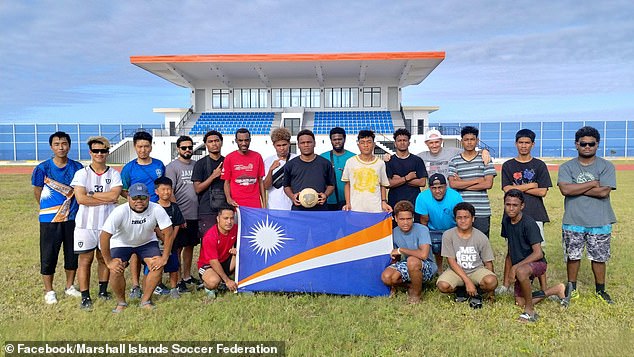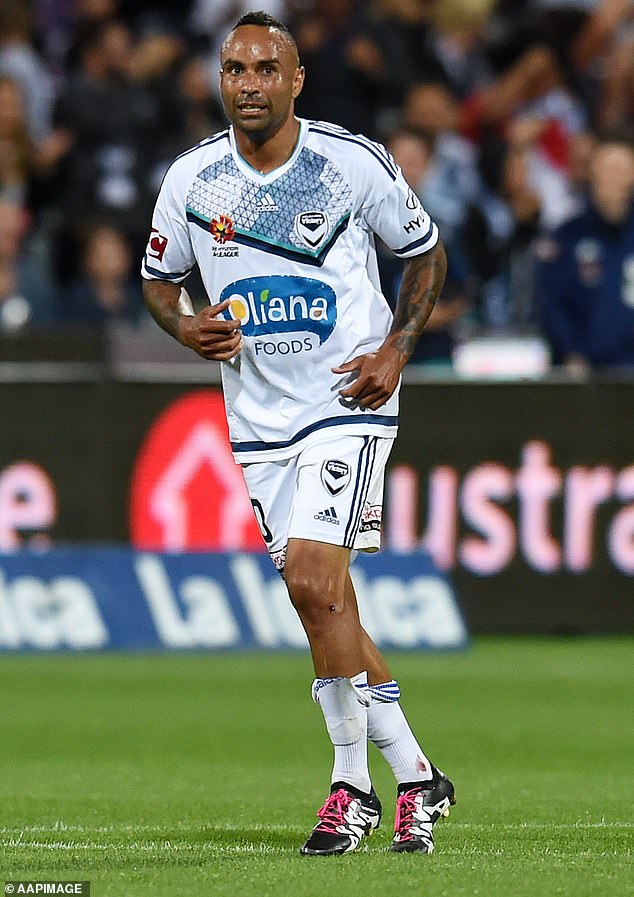Why there is a push to develop international football in the last nation without a team – if nuclear extinction or climate change flooding doesn’t wipe the locals out first
- The Marshall Islands currently does not have an international football team
- Located 5270 km from Australia in the Micronesia region of Oceania
- With a population of 42,000, there is room to develop footballers
As it stands, the Marshall Islands in the Micronesia region of Oceania are the last remaining sovereign nation in the world without an international football team.
And if three determined English men get their way, that could change sooner or later.
The Republic is located 5,270 km from Australia, has five islands and just over 42,000 inhabitants.
Nuclear extinction and climate change flooding are ongoing concerns for locals, but natural disasters aside, Justin Walley, Matt Webb and aspiring coach Lloyd Owers remain determined to make football the number one sport in the country.
Basketball now has that mantle, and hypothetically, recruiting and developing 11 quality soccer players for tomorrow’s international qualifier could be a tall order.
Some would say impossible.
As it stands, the Marshall Islands (pictured) are the last remaining sovereign nation in the world without an international football team

With a population of just over 42,000, there is room for a future national team (photo: a current crop of enthusiastic locals)

In 2001, the divide between established footballing nations and minnows became apparent when the Socceroos defeated American Samoa 31-0 in a World Cup qualifier – Archie Thompson (pictured) scoring 13 goals for Australia
There is also significant work to be done when it comes to the global game in the Marshall Islands – the sovereign nation currently has no football clubs or leagues.
If that’s not enough, there are also no fields, goal posts and only a handful of balls.
The creation of a football federation in 2020 was a positive step for a country previously annexed by Germany, occupied by Japan during World War I and then by the US after World War II.
Bikini Atoll on the islands was also the site where America conducted 67 nuclear weapons tests between 1945 and 1958.
To this day, the enormous concrete dome on Runit Island, which contains radioactive waste, is an understandable sore point among locals. To make matters worse, a crack has appeared.
Climate change is also a real threat. According to research conducted by the Marshall Islands government with the World Bank in 2021, a 1-meter sea wave has the potential to inundate 40 percent of structures and wipe out entire islands.
A Netflix sports documentary – perhaps similar to the 2023 film Next goal wins, which showed the fortunes of American Samoa – which infamously lost 31-0 to the Socceroos in a World Cup qualifier in 2001 – could see football become a permanent focus in the Marshall Islands.
At the time, that one-sided result launched the career of Archie Thompson, who scored 13 goals for Australia at Coffs Harbor on the NSW north coast.
Still just 22 at the time, Thompson went abroad with an enviable reputation as a goalscorer, enjoying spells in Belgium and the Netherlands.
“That (a documentary) could be a game changer for us,” Walley said Fairfax.
‘The last country on earth without football would be a great story. ‘For me, this is a story that needs to be told.”
